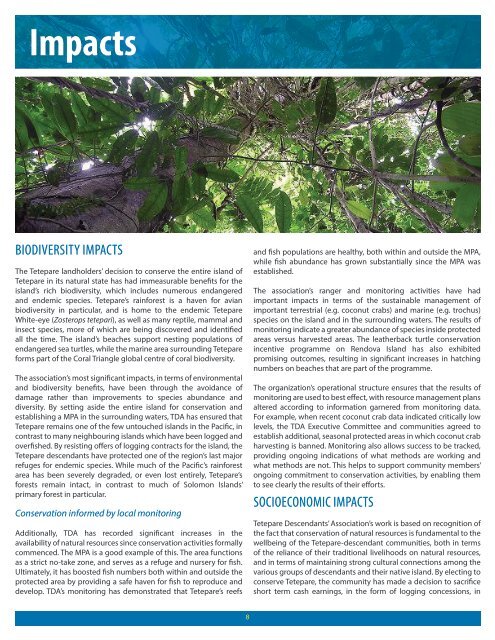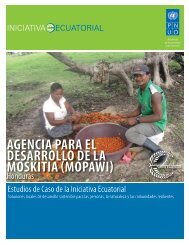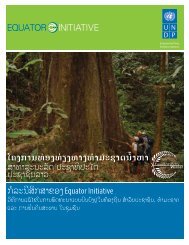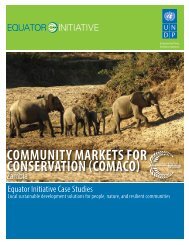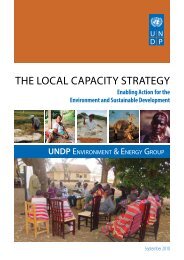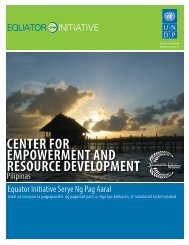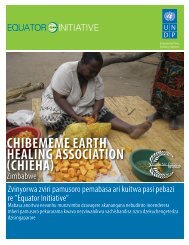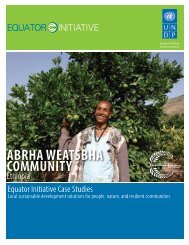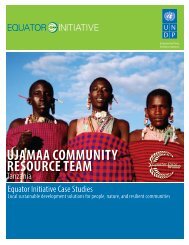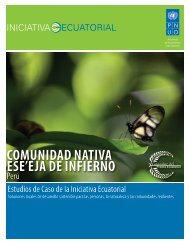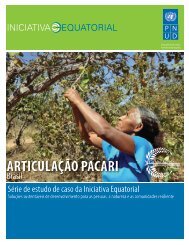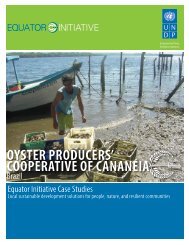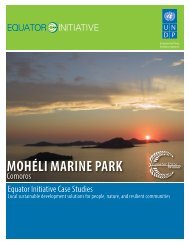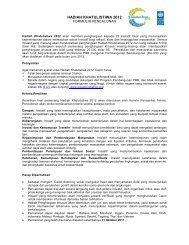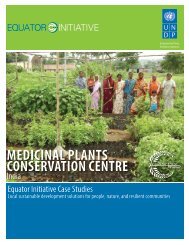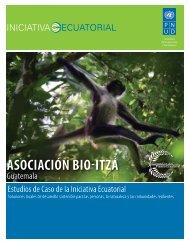Tetepare Descendants' Association (TDA) - Equator Initiative
Tetepare Descendants' Association (TDA) - Equator Initiative
Tetepare Descendants' Association (TDA) - Equator Initiative
Create successful ePaper yourself
Turn your PDF publications into a flip-book with our unique Google optimized e-Paper software.
Impacts<br />
BIODIVERSITY IMPACTS<br />
The <strong>Tetepare</strong> landholders’ decision to conserve the entire island of<br />
<strong>Tetepare</strong> in its natural state has had immeasurable benefits for the<br />
island’s rich biodiversity, which includes numerous endangered<br />
and endemic species. <strong>Tetepare</strong>’s rainforest is a haven for avian<br />
biodiversity in particular, and is home to the endemic <strong>Tetepare</strong><br />
White-eye (Zosterops tetepari), as well as many reptile, mammal and<br />
insect species, more of which are being discovered and identified<br />
all the time. The island’s beaches support nesting populations of<br />
endangered sea turtles, while the marine area surrounding <strong>Tetepare</strong><br />
forms part of the Coral Triangle global centre of coral biodiversity.<br />
The association’s most significant impacts, in terms of environmental<br />
and biodiversity benefits, have been through the avoidance of<br />
damage rather than improvements to species abundance and<br />
diversity. By setting aside the entire island for conservation and<br />
establishing a MPA in the surrounding waters, <strong>TDA</strong> has ensured that<br />
<strong>Tetepare</strong> remains one of the few untouched islands in the Pacific, in<br />
contrast to many neighbouring islands which have been logged and<br />
overfished. By resisting offers of logging contracts for the island, the<br />
<strong>Tetepare</strong> descendants have protected one of the region’s last major<br />
refuges for endemic species. While much of the Pacific’s rainforest<br />
area has been severely degraded, or even lost entirely, <strong>Tetepare</strong>’s<br />
forests remain intact, in contrast to much of Solomon Islands’<br />
primary forest in particular.<br />
Conservation informed by local monitoring<br />
Additionally, <strong>TDA</strong> has recorded significant increases in the<br />
availability of natural resources since conservation activities formally<br />
commenced. The MPA is a good example of this. The area functions<br />
as a strict no-take zone, and serves as a refuge and nursery for fish.<br />
Ultimately, it has boosted fish numbers both within and outside the<br />
protected area by providing a safe haven for fish to reproduce and<br />
develop. <strong>TDA</strong>’s monitoring has demonstrated that <strong>Tetepare</strong>’s reefs<br />
and fish populations are healthy, both within and outside the MPA,<br />
while fish abundance has grown substantially since the MPA was<br />
established.<br />
The association’s ranger and monitoring activities have had<br />
important impacts in terms of the sustainable management of<br />
important terrestrial (e.g. coconut crabs) and marine (e.g. trochus)<br />
species on the island and in the surrounding waters. The results of<br />
monitoring indicate a greater abundance of species inside protected<br />
areas versus harvested areas. The leatherback turtle conservation<br />
incentive programme on Rendova Island has also exhibited<br />
promising outcomes, resulting in significant increases in hatching<br />
numbers on beaches that are part of the programme.<br />
The organization’s operational structure ensures that the results of<br />
monitoring are used to best effect, with resource management plans<br />
altered according to information garnered from monitoring data.<br />
For example, when recent coconut crab data indicated critically low<br />
levels, the <strong>TDA</strong> Executive Committee and communities agreed to<br />
establish additional, seasonal protected areas in which coconut crab<br />
harvesting is banned. Monitoring also allows success to be tracked,<br />
providing ongoing indications of what methods are working and<br />
what methods are not. This helps to support community members’<br />
ongoing commitment to conservation activities, by enabling them<br />
to see clearly the results of their efforts.<br />
SOCIOECONOMIC IMPACTS<br />
<strong>Tetepare</strong> Descendants’ <strong>Association</strong>’s work is based on recognition of<br />
the fact that conservation of natural resources is fundamental to the<br />
wellbeing of the <strong>Tetepare</strong>-descendant communities, both in terms<br />
of the reliance of their traditional livelihoods on natural resources,<br />
and in terms of maintaining strong cultural connections among the<br />
various groups of descendants and their native island. By electing to<br />
conserve <strong>Tetepare</strong>, the community has made a decision to sacrifice<br />
short term cash earnings, in the form of logging concessions, in<br />
8


